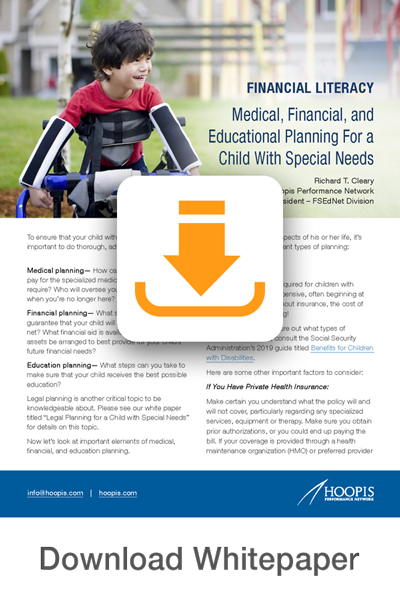Medical, Financial, and Educational Planning For a Child With Special Needs

To ensure that your child with special needs receives the best possible care in all aspects of his or her life, it’s important to do thorough, advance planning. In this white paper, we cover 3 important types of planning:
Medical planning— How can you best obtain and pay for the specialized medical care your child may require? Who will oversee your child’s medical care when you’re no longer here?
Financial planning— What steps can you take to guarantee that your child will have a financial safety net? What financial aid is available? How should your assets be arranged to best provide for your child’s future financial needs?
Education planning— What steps can you take to make sure that your child receives the best possible education?
Legal planning is another critical topic to be knowledgeable about. Please see our white paper titled “Legal Planning for a Child with Special Needs” for details on this topic.
Now let’s look at important elements of medical, financial, and education planning.
Medical Planning
The medical treatment required for children with special needs can be expensive, often beginning at or shortly after birth. Without insurance, the cost of medical care is staggering!
As a starting point to figure out what types of benefits are available, consult the Social Security Administration’s 2019 guide titled Benefits for Children with Disabilities.
Here are some other important factors to consider:
If You Have Private Health Insurance:
Make certain you understand what the policy will and will not cover, particularly regarding any specialized services, equipment or therapy. Make sure you obtain prior authorizations, or you could end up paying the bill. If your coverage is provided through a health maintenance organization (HMO) or preferred provider organization (PPO), confirm that the specialists your child needs are part of the network. Understand when you can seek out-of-network care and what the cost will be to you. If a claim is denied, get a written explanation of the reason…you may want to appeal and resubmit the claim.
Request that a case manager be assigned to your child. That will enable you to work consistently with someone who is familiar with your child’s situation and needs.
If You Do Not Have Private Health Insurance:
Check with your county social services or Social Security office to determine what assistance is available.
Medicaid is a health-care program for people with low incomes and limited assets. In most states, children who get SSI (Supplemental Security Income) benefits, qualify for Medicaid. In many states, Medicaid comes automatically with SSI eligibility. In other states, you must sign up for it. Also, some children can get Medicaid coverage even if they don’t qualify for SSI. In addition, the State Children’s Health Insurance Program (SCHIP) enables states to insure children from working families with incomes too high to qualify for Medicaid, but too low to afford private health insurance. Your state Medicaid agency can provide more information about SCHIP.
When Your Disabled Child Turns 18:
Medicaid benefits are payable based on the child’s own assets and income, even if he or she is still living at home with you.
Health-Care Reform:
The Patient Protection and Affordable Care Act of 2010 (health-care reform) has several provisions that can impact medical/insurance planning for your child with special needs. By no later than September 23, 2010, all young adults under age 27 may be able to continue health-care coverage through a parent’s policy. Here are some other provisions you should be aware of:
- Effective no later than September 23, 2010, individual and group health insurance plans are prohibited from using pre-existing condition exclusions for children and cannot place lifetime limits on the dollar value of coverage.
- Also effective in 2010, insurers cannot deny or rescind coverage of insureds who become sick.
- As of January 1, 2014, insurers are prohibited from placing any annual limits on the dollar value of coverage.
- As of January 1, 2014, most U.S. citizens and legal residents are required to have minimum essential health insurance coverage. Insurers cannot deny or cancel coverage to anyone with a preexisting condition. Health insurance premium subsidies are available to eligible individuals and families with incomes between 100 percent and 400 percent of the federal poverty level (e.g., $25,100 to $100,400 in 2018–19 for a family of four). Individuals with incomes of less than 138 percent of the federal poverty level qualify for Medicaid coverage, unless the state in which they reside opted out of the Affordable Care Act Medicaid expansion.
- As of January 1, 2019, the penalty assessed to individuals who fail to maintain minimum essential coverage is $0.
Financial Planning
Financial planning is important for any family, and it’s even more critical for the families who have a child with special needs. Planning well in advance enables you to take advantage of the benefits of compounding interest over time and to ensure that your assets are all in the right place. You don’t want to jeopardize your child’s ability to receive public assistance.
Government Benefits:
Supplemental Security Income (SSI) benefits are payable to adults or children who are blind or disabled. SSI supplements a person’s income up to a certain level, which varies from state to state. In the case of disabled children under age 18, the parents’ income and assets are considered when deciding if the child qualifies for SSI benefits. Beginning at age 18, SSI benefits are determined based on the disabled person’s income and assets. As a result, a child who was not eligible for SSI before age 18 may become eligible at age 18. To qualify for SSI benefits, the disabled person cannot have “countable resources” (assets) in excess of $2,000 or “countable income” in excess of the maximum federal benefit rate. In the case of ABLE Accounts, discussed below, the first $100,000 in an ABLE Account will be disregarded for SSI benefit purposes.
Additional financial resources are available through state and community programs. Consult with the appropriate federal, state, county, and/or local agencies for assistance.
Other Financial Considerations:
A Special Needs Trust
The purpose of a special needs trust is to provide financial assets for your child’s future care and well-being, while maintaining his or her eligibility for government benefits, such as Social Security, Supplemental Security Income, Medicare, or Medicaid. Please see our white paper titled “Legal Planning for a Child with Special Needs” for detailed information on this topic.
The Achieving a Better Life Experience (ABLE) Program
The Achieving a Better Life Experience (ABLE) Program is designed to help individuals and families use taxfree savings accounts to help finance their longer-term disability needs, without the loss of federal benefits if savings exceed certain limits.
The earnings on contributions to ABLE Accounts will not be taxed, and the funds in these accounts will not be considered for the Supplemental Security Income (SSI) program, Medicaid, and other federal means-tested benefits. However, if an ABLE Account exceeds $100,000, SSI benefits will be suspended but not terminated.
To be eligible for an ABLE Account, an individual must become blind or disabled before age 26 and (1) receive Social Security Disability Insurance (SSDI) or SSI or (2) file a disability certification under rules yet to be written.
Anyone, including the disabled individual, may establish an ABLE Account for an eligible beneficiary. An eligible disabled individual, however, will be limited to one ABLE Account, and total aggregate annual contributions to that account may not exceed the annual gift tax exemption ($15,000 in 2019). Because ABLE contributions are treated as gifts by the contributor for tax purposes, if a donor puts the maximum $15,000 in an ABLE Account in 2019, any other gifts to the beneficiary will trigger the requirement to file a gift tax return. No gift tax will be due in 2019, however, unless the donor has already made more than $11.4 million in lifetime taxable gifts.
In addition, Section 529 Plan assets may be rolled over to an ABLE account, up to the maximum annual gift tax exemption ($15,000 in 2019). Both accounts must have the same beneficiary or be related to a member of the same family. Contributions to an ABLE Account will be made with after-tax dollars, but earnings on contributions will be tax-free, and distributions from the account for qualified disability expenses will not be considered taxable income to either contributors or the eligible beneficiary. Qualified disability expenses include any expenses made for the benefit of the disabled beneficiary related to education, housing, transportation, employment training and support, assistive technology and personal support services, health, prevention and wellness, financial management and administrative services, legal fees, expenses for oversight and monitoring, and funeral and burial expenses.
Distributions used for nonqualified expenses will be subject to income tax on the portion of the distribution attributable to earnings from the account, plus a 10% penalty.
Assets in an ABLE Account can be rolled over, without penalty, into another ABLE Account for either the qualified beneficiary or any of the beneficiary’s qualifying family members.
At the death of the qualified beneficiary, it may be required that any assets remaining in an ABLE Account be used to reimburse a state Medicaid agency for the cost of benefits and services provided during the disabled beneficiary’s lifetime. As a result, an ABLE Account should not be considered a wealth-accumulation mechanism.
Education Planning
Undoubtedly, you want your child to receive the best education possible. To assure this outcome requires that you become your child’s advocate and a participant in his or her education plan.
The first step is understanding the education laws that apply to children with disabilities. Here is an overview of 3 related laws.
1. Individuals with Disabilities Education Act (IDEA)
- The Individuals with Disabilities Education Act requires that children with special needs receive the following:
- A free appropriate public education from ages 3 through 21.
- Education provided as close to home as possible, with children who do not have disabilities.
- Additional services, such as speech therapy, occupational therapy, or a classroom aide, which are designed to meet their unique needs and prepare them for employment and independent living.
An assessment to determine their needs. The law guarantees two types of assistance:
- Individualized Education Plan (IEP). The IEP is a written statement of your child’s abilities and impairments. It is developed by a team that includes you, school district personnel, and educational professionals who have evaluated your child and his or her abilities. The IEP must be reviewed at least annually.
- Due process. As a parent, you have both rights and responsibilities in relation to your child’s IEP. Due process provides a mechanism to resolve any disagreements regarding a child’s IEP.
Under IDEA, for a child to be eligible for special education, he or she must have issues in at least one of the following categories:
- A serious emotional disturbance
- A learning differences
- Intellectual disability
- Having had a traumatic brain injury
- Being diagnosed on the spectrum of autism
- Vision and hearing impairments
- Physical disabilities
- Developmental delays (including speech and language difficulties)
- Other health impairments
Before your child approaches age 22, you are advised to have a plan in place to address the issues that are sure to arise as he or she transitions out of the public education system. Depending on the nature of your child’s disability, this plan can include additional educational or vocational services, work, or ongoing rehabilitation and medical services. Planning for these needs requires that you conduct research years before your child reaches age 22.
2. Section 504
Section 504 is a civil rights statute (1973) that requires that schools not discriminate against children with disabilities and provide them with reasonable accommodations. It covers all programs or activities, whether public or private, that receive any federal financial assistance. Reasonable accommodations include untimed tests, sitting in front of the class, modified homework, and the provision of necessary services. Typically, children covered under Section 504 either have less severe disabilities than those covered under IDEA or have disabilities that do not fit within IDEA. Under Section 504, any person who has an impairment that substantially limits a major life activity is considered disabled. Learning and social development are included on the list of major life activities.
3. The Americans with Disabilities Act (ADA)
The ADA (1990) requires all schools, other than those operated by religious organizations, to meet the needs of children with these differences or disorders. Under the ADA, children who qualify cannot be denied educational services, programs, or activities, and the law prohibits discrimination against all such students. Many children with special needs are of average or above-average intellect. There are many colleges whose programs might be appropriate for your son or daughter. If he or she can obtain a college degree, it will greatly enhance employability.
Further Help and Advice
As you know, parenting a child with special needs has its own unique set of joys and challenges. While you are undoubtedly the foremost expert on your child and his or her needs, desires, and future aspirations, it can be a daunting task to undertake special-needs planning on your own.
Because of the specialized nature of special-needs planning, it is wise to seek out professionals (attorneys, trust officers, financial advisors, etc.) who have experience in the special-needs planning process. Guidance counselors, special education professionals, and other parents with special needs children can also be great resources to connect with.
In addition, there are a variety of organizations that provide assistance to people with disabilities and their families. Here are just a few examples:
- The National Dissemination Center for Children with Disabilities (NICHCY), an acronym derived from its original name, National Information Center for Handicapped Children and Youth) operated as a national centralized information resource on disabilities and special education for children and youth ages birth through 21 years, sponsored by the U.S. Department of Education.
- National Association of Parents with Children in Special Education (www.napcse.org). This organization offers parents of children in special education information on how to be their child’s best advocate.
- eParent (www.eparent.com). This website is written for families of children and young adults with disabilities and special needs.
- Parents Helping Parents (www.php.com). The mission of this parental resource center is to help children with special needs reach their full potential.
A Final Note
The planning process shouldn’t stop as your child gets older. As he or she ages, so do we. There are certain issues we all need to address regarding our final arrangements. It is most helpful to your family members if pre-planning and/or prefunding of your own final wishes are set in place when you feel it is appropriate.
We also want you to know about a unique feature of the Social Security System that occurs when a parent of a disabled child or adult applies for retirement benefits. As part of the interview, you will be asked if you have a disabled child. The good news is that a “yes” answer provides that child with an additional income stream of Social Security benefits from your retirement income. The bad news is that it also complicates the situation because it eliminates the opportunity for the child to receive SSI and Medicaid benefits directly.
Depending on your child’s disability, Medicaid benefits might be particularly important. Medicaid, for example, will pay for home aides for your child, while Medicare will not. Be sure to check…additional Medicaid benefits might be available through your state Social Services Division.



